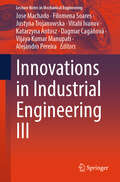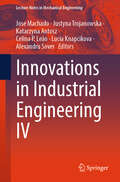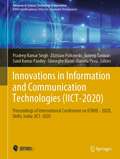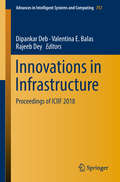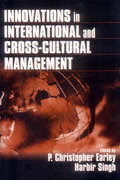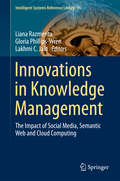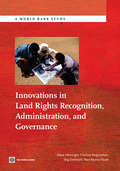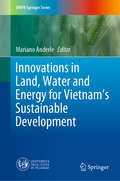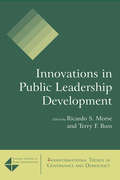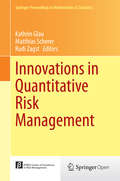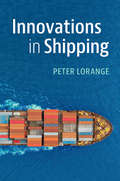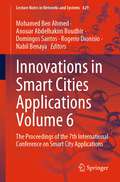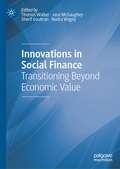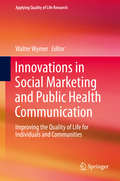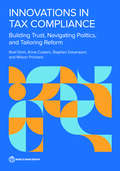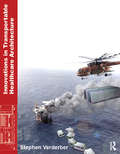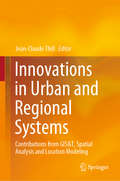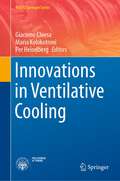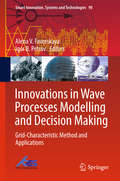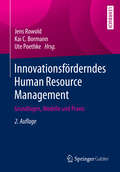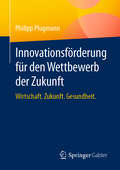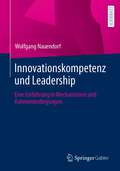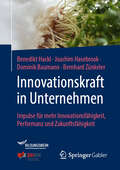- Table View
- List View
Innovations in Industrial Engineering III (Lecture Notes in Mechanical Engineering)
by Dagmar Cagáňová Filomena Soares Vitalii Ivanov Justyna Trojanowska Jose Machado Vijaya Kumar Manupati Alejandro Pereira Katarzyna AntoszThis book reports on innovations and engineering achievements of industrial relevance, with a special emphasis on industrial engineering developments aimed at improving the quality of processes and products in the context of a sustainable economy. It gathers peer-reviewed papers presented at the 3rd International Conference “Innovation in Engineering”, ICIE 2024, held on June 26-28, 2024, in Povoação, São Miguel Island, Azores, Portugal. All in all, this third volume of a three-volume set, provides engineering researchers and professionals with a timely snapshot of technologies and strategies that should help shaping different industrial sectors to improve production efficiency, industrial sustainability, and human well-being.
Innovations in Industrial Engineering IV (Lecture Notes in Mechanical Engineering)
by Justyna Trojanowska Jose Machado Lucia Knapcikova Katarzyna Antosz Celina P. Leão Alexandru SoverThis book reports on innovations and engineering achievements of industrial relevance, with a special emphasis on industrial engineering developments aimed at improving the quality of processes and products in the context of a sustainable economy. It gathers peer-reviewed papers presented at the 4th International Conference &“Innovation in Engineering&”, ICIE 2025, held on June 18-20, 2025, in Prague, Czech Republic. All in all, this third volume of a three-volume set provides engineering researchers and professionals with a timely snapshot of technologies and strategies that should help shaping different industrial sectors to improve production efficiency, industrial sustainability, and human well-being.
Innovations in Information and Communication Technologies: Proceedings of International Conference on ICRIHE - 2020, Delhi, India: IICT-2020 (Advances in Science, Technology & Innovation)
by Pradeep Kumar Singh Sudeep Tanwar Zdzislaw Polkowski Sunil Kumar Pandey Gheorghe Matei Daniela PirvuThis edited book is comprised of original research that focuses on technological advancements for effective teaching with an emphasis on learning outcomes, ICT trends in higher education, sustainable developments and digital ecosystem in education, management and industries. The contents of the book are classified as; (i) Emerging ICT Trends in Education, Management and Innovations (ii) Digital Technologies for advancements in education, management and IT (iii) Emerging Technologies for Industries and Education, and (iv) ICT Technologies for Intelligent Applications. The book represents a useful tool for academics, researchers, industry professionals and policymakers to share and learn about the latest teaching and learning practices supported by ICT. It also covers innovative concepts applied in education, management and industries using ICT tools.
Innovations in Infrastructure: Proceedings of ICIIF 2018 (Advances in Intelligent Systems and Computing #757)
by Rajeeb Dey Valentina E. Balas Dipankar DebThe book covers innovative research and its applications in infrastructure development and related areas. This book discusses the state-of-art development, challenges and unsolved problems in the field of infrastructure/smart development, control engineering, power system infrastructure, smart infrastructure, waste management and renewable energy. The solutions discussed in this book encourage the researchers and IT professionals to put the methods into their practice.
Innovations in International and Cross-Cultural Management
by P. Christopher Earley Harbir SinghPresenting cross-cultural research on a wide range of organizational topics, this book ranges from the individual to the macro level. Among the issues examined are: organizational trust in international settings, HRM issues in international joint ventures, developing strategic advantage across borders, and social partnerships for sustainable growth.
Innovations in Knowledge Management
by Lakhmi C. Jain Liana Razmerita Gloria Phillips-WrenThis book discusses emerging trends in the field of managing knowledge work due to technological innovations. The book is organized in 3 sections. The first section, entitled "Managing Knowledge, Projects and Networks", discusses knowledge processes and their use, reuse or generation in the context of an organization. The second section, entitled "Managing Knowledge using Social Media", focuses on factors influencing adoption and usage, the role of social media in managing knowledge, and factors that influence employees' acceptance and participation. The third section brings into discussion new approaches and technologies for acquiring knowledge. The book will be useful to both academics engaged in research in knowledge management and practitioners who are considering or implementing strategies for managing one of their most important resources.
Innovations in Land Rights Recognition, Administration, and Governance
by Paul Munro-Faure Clarissa Augustinus Stig Enemark Klaus DeiningerThe importance of good land governance to strengthen women's land rights, facilitate land-related investment, transfer land to better uses, use it as collateral, and allow effective decentralization through collection of property taxes has long been recognized. The challenges posed by recent global developments, especially urbanization, increased and more volatile food prices, and climate change have raised the profile of land and the need for countries to have appropriate land policies. However, efforts to improve country-level land governance are often frustrated by technical complexities, institutional fragmentation, vested interests, and lack of a shared vision on how to move towards good land governance and measure progress in concrete settings. Recent initiatives have recognized the important challenges this raises and the need for partners to act in a collaborative and coordinated fashion to address them. The breadth and depth of the papers included in this volume, all of which were presented at the World Bank's Annual Conference on Land Policy and Administration, illustrate the benefits from such collaboration. They are indicative not only of the diversity of issues related to land governance but, more importantly, highlight that, even though the topic is complex and politically challenging, there is a wealth of promising new approaches to improving land governance through innovative technologies, country-wide policy dialogue, and legal and administrative reforms. The publication is based on an on-going partnership between the World Bank, the International Federation of Surveyors, the Global Land Tool Network and the United Nations Food and Agriculture Organization provide tools that can help to address land governance in practice and at scale. It is our hope that this volume will be of use to increase awareness of and support to the successful implementation of innovative approaches that can help to not only improve land governance, but also thereby contribute to the well-being of the poorest and the achievement of the Millennium Development Goals.
Innovations in Land, Water and Energy for Vietnam’s Sustainable Development (UNIPA Springer Series)
by Mariano AnderleThis book presents recent innovative trends in land, water and energy management in Vietnam. Presenting the main projects and outcomes of a close collaboration between Italian and Vietnamese researchers in the last three years, the book is divided into three main sections: environment, climate change and land management in Vietnam; energy for Vietnam; and cities and utilities in Vietnam. The first section focuses on water systems, including rivers and seacoasts, and on new growing methods for more sustainable agriculture. The second section addresses energy and wastewater. The country’s rapid growth is a major challenge in terms of reinforcing the electrical infrastructures, and as such this section offers an overview of the government’s planned measures and their impact on the Vietnamese power system. The third section highlights cities and utilities in the context of increasing urbanization, exploring the urban morphology of the Vietnamese metropolis, particularly Hanoi and Ho Chi Minh City.
Innovations in Public Leadership Development (Transformational Trends In Governance And Democracy Ser.)
by Terry F. Buss Ricardo S. MorseThis is the best single-source guide to leadership development in the public sector. It offers a wealth of advice for teachers, students, trainers, human resource officers, and established leaders. The all-original chapters include discussions of leadership frameworks, competencies for public leaders for the "new governance," and strategies for senior leaders in government.The book's wide-ranging coverage includes in-depth discussions of specific approaches to learning methods such as action learning and social artistry, as well as presentations of leader development models such as transformational stewardship and global leadership. The contributors present experiences from real-world leadership development programs, and the book situates leader development within the current trends of networks, collaboration, and boundary-crossing work in the public sector.
Innovations in Quantitative Risk Management
by Kathrin Glau Matthias Scherer Rudi ZagstQuantitative models are omnipresent -but often controversially discussed- in todays risk management practice. New regulations, innovative financial products, and advances in valuation techniques provide a continuous flow of challenging problems for financial engineers and risk managers alike. Designing a sound stochastic model requires finding a careful balance between parsimonious model assumptions, mathematical viability, and interpretability of the output. Moreover, data requirements and the end-user training are to be considered as well. The KPMG Center of Excellence in Risk Management conference Risk Management Reloaded and this proceedings volume contribute to bridging the gap between academia -providing methodological advances- and practice -having a firm understanding of the economic conditions in which a given model is used. Discussed fields of application range from asset management, credit risk, and energy to risk management issues in insurance. Methodologically, dependence modeling, multiple-curve interest rate-models, and model risk are addressed. Finally, regulatory developments and possible limits of mathematical modeling are discussed.
Innovations in Shipping
by Peter LorangeInnovations are dramatically changing the traditionally conservative global ocean shipping industry as it works to become more efficient and more sustainable. Academic and former shipping company owner Peter Lorange is best placed to make sense of how to approach and keep ahead of these changes. This book explains what the key innovations are, how to ensure a return on investment, the barriers to innovation and how to overcome them. Drawing on a number of specialist case studies, Lorange outlines the specific analytical and decision-making steps to consider and actions to take to arrive at a new strategic blueprint for modern shipping companies. This book is invaluable for practising shipping company executives, advanced students of shipping, logistics, port management and maritime economics and investors deciding whether to invest in a particular shipping firm.
Innovations in Smart Cities Applications Volume 6: The Proceedings of the 7th International Conference on Smart City Applications (Lecture Notes in Networks and Systems #629)
by Mohamed Ben Ahmed Anouar Abdelhakim Boudhir Domingos Santos Rogerio Dionisio Nabil BenayaThis book highlights original research and recent advances in various fields related to smart cities and their applications. Bringing together new contributions by prominent researchers from around the globe, the book is a rich pedagogical tool and an inspiring research support for courses on computer science, electrical engineering, and urban sciences. The book gathers papers presented at the 7th International Conference on Smart City Applications (SCA 2022), held on October 19–21, 2022, in Castelo Branco, Portugal. The technical program of SCA 2022 consisted of 80 papers. The keynote speakers were Eng. Loide Monteiro (Foundation Smart City Cape Verde), Prof. Teodora Vuckovic (University of Novi Sad), Prof. Susana Sargento (University of Aveiro), Prof. Andy Van Den Dobblesteen (TU Delft), and Prof. Juan Corchado (University of Salamanca). SCA 2022 provided a good forum for all researchers to discuss all aspects of science and technology that are relevant to smart city applications.
Innovations in Social Finance: Transitioning Beyond Economic Value
by Thomas Walker Jane McGaughey Sherif Goubran Nadra WagdyOur world is experiencing increasingly complex social and environmental challenges. The prevailing business models and, to some extent, capitalism per se, are frequently blamed for these problems due to their neglect of social and environmental values in favour of financial returns. Within this context, social finance has attracted the attention of governments, organizations, entrepreneurs, and researchers as a means of mobilizing resources and innovation with the goal of establishing effective long-term solutions. This edited collection summarizes, discusses, and analyzes new innovative trends in social finance. It features contributions that aim to highlight emerging trends (products, tools, and processes) in social finance, present a series of case studies related to the development, deployment, and scaling of social finance innovations, offer an understanding of how non-economic externalities are being incorporated, managed, and assessed in recent innovations, reveal the disruptive potential of social finance innovations by analyzing how they are redefining mainstream finance, analyze the scales – of operation and impact – of different innovations, and explore the complex relationship between social finance and social innovation. Featuring contributions from both the research and practitioner community as well as policy actors, the book provides more than a snapshot of the current social finance field by specifically highlighting the major challenges and difficulties that require the urgent attention of policymakers and social entrepreneurs.
Innovations in Social Marketing and Public Health Communication
by Walter WymerThis volume presents the most current theoretical advances in the fields of social marketing and public health communications. The volume is divided in two parts. Part 1 contains chapters pertaining to research and theory reflecting improvements and contributions to theories that help improving quality of life. It includes literature reviews, conceptual research and empirical studies on social marketing communications, models to understand individual's risky behaviors, and how to improve social interventions. The second part emphasizes applied research, consisting of best practices, applied experiments, and case studies on social marketing innovative practices with implications for quality of life.
Innovations in Tax Compliance: Building Trust, Navigating Politics, and Tailoring Reform
by Roel Dom Anna Custers Stephen Davenport PrichardRecent decades have seen important progress in strengthening country tax systems. Yet many areas of reform have remained stubbornly resistant to major improvements. Overall, revenue collection still falls short of that needed for effective governance and service delivery. Tax collection is too often riddled with high rates of evasion among large corporations and the rich and by disproportionate, though often hidden, burdens on lower-income groups. As countries around the world deal with the large debt burdens induced by COVID-19, an in-depth look at how to strengthen tax systems is especially timely. Innovations in Tax Compliance: Building Trust, Navigating Politics, and Tailoring Reform takes a fresh look at tax reform. The authors draw on recent research and experience for their new conceptual framework to guide more effective approaches to reform. Building on the achievements of recent decades, they argue for a greater emphasis on the overlapping goals of building trust, navigating political resistance, and tailoring reform to unique local contexts—an emphasis achieved by identifying the most binding constraints on reform. This focus not only can lead to greater compliance, a fairer system, and higher revenues, but also can contribute to building state capacity, sustained political support for further reforms, and a stronger fiscal contract between citizens and governments.
Innovations in Transportable Healthcare Architecture
by Stephen VerderberInnovations in Transportable Healthcare Architecture is the first book to examine the ways that healthcare architecture can provide better assistance in disaster-stricken communities. Aimed at architects and other professionals working across the disaster relief sector, it provides: An overview of the need for rapid response healthcare facilities; Global case studies which demonstrate real examples; Historical perspectives on redeployables used in past military and civilian contexts; Analysis of the advantages, challenges, and opportunities associated with offsite, premanufactured healthcare facilities and their component systems, for permanent installations or reuse on multiple sites; Planning and design considerations for transportable offsite-built healthcare architecture; State-of-the-art research on pop-up clinics, truck-based configurations, ISO container-based outpatient clinical and trauma care centres, and modularized facilities for contemporary military and civilian contexts. Innovations in Transportable Healthcare Architecture will be an invaluable reference source for architects, disaster mitigation planners, design and engineering practitioners, non-governmental medical aid organizations (NGOs), governmental health ministries, and policy specialists across the spectrum of disciplines engaged in disaster mitigation and the provision of healthcare in medically underserved communities globally.
Innovations in Urban and Regional Systems: Contributions from GIS&T, Spatial Analysis and Location Modeling
by Jean-Claude ThillThis book presents cutting‐edge research on urban and regional systems applying modern spatial analytical techniques of Geographic Information Science & Technologies (GIS&T), spatial statistics, and location modeling. The contributions, written by leading scholars from around the globe, adopt a spatially explicit analytical perspective and highlight methodological innovations and substantive breakthroughs on many facets of the socioeconomic and environmental reality of urban and regional contexts. The book is divided into three parts: The first part offers an introduction to the research field, while the second part discusses critical issues in urban growth and urban management, presenting case studies on city and urban environments, their growth, data infrastructures and spatial and management issues. The third part then broadens the analysis to the regional scale, addressing growth, convergence and adaptation to new economic and information‐based realities. This book appeals to scholars of spatial and regional sciences as well as to policy decision-makers interested in advanced methods of spatial analysis, location modeling, and GIS&T.
Innovations in Ventilative Cooling (PoliTO Springer Series)
by Maria Kolokotroni Giacomo Chiesa Per HeiselbergThis book includes the most recent outcomes from research and professional practice in the ventilative cooling field, gathered by the selected panel of authors. It provides essential contents to face and reduce the rise of space cooling and ventilation energy uses in buildings by alternative ventilation and cooling solutions. The book is organised into three parts which include a detailed description of ventilative cooling boundaries and implications (working principles, KPIs, standards, comfort models, control techniques) and of principal techniques (night ventilation, controlled natural ventilation, hybrid solutions, PCM and mass activation, evaporative cooling, earth-to-air heat exchangers) along with an updated analysis of the background to the topic. Furthermore, the last part of the book defines a unique practical and theoretical framework to include ventilative cooling solutions in different building typologies along with their principal implications.
Innovations in Wave Processes Modelling and Decision Making: Grid-Characteristic Method and Applications (Smart Innovation, Systems and Technologies #90)
by Alena V. Favorskaya Igor B. PetrovThis book presents methods for full-wave computer simulation that can be used in various applications and contexts, e.g. seismic prospecting, earthquake stability, global seismic patterns on Earth and Mars, medicine, traumatology, ultrasound investigation of the human body, ultrasound and laser operations, ultrasonic non-destructive railway testing, modelling aircraft composites, modelling composite material delamination, etc. The key innovation of this approach is the ability to study spatial dynamical wave processes, which is made possible by cutting-edge numerical finite-difference grid-characteristic methods. The book will benefit all students, researchers, practitioners and professors interested in numerical mathematics, computer science, computer simulation, high-performance computer systems, unstructured meshes, interpolation, seismic prospecting, geophysics, medicine, non-destructive testing and composite materials.
Innovations in the Retail Banking Industry: The Impact of Organizational Structure and Environment on the Adoption Process (Financial Sector of the American Economy)
by Lisa M. SciulliThis research empirically validates a typology of innovations by examining the differential effects of organizational structure and environmental perceptions on the types of innovations adopted in an organization. Four types of innovations are depicted in the typology— incremental, product, process, and radical innovations.
Innovationsfähigkeit der Finanzbranche: Erfolgsfaktoren und Hindernisse für Genossenschaftsbanken (essentials)
by Esther Bollhöfer Jennifer LegerGenossenschaftsbanken stehen in der aktuellen Zeit vor großen Herausforderungen. Sie geraten aufgrund rasanter Entwicklungen stark unter Druck. Um sich auf dem Markt gegen Fintechs und Startups zu behaupten, müssen traditionelle Banken wie Genossenschaften ihren Fokus auf die Entwicklung neuer Geschäftsmodelle legen, wodurch Wachstumspotenziale geschaffen und neue Ertragsmöglichkeiten generiert werden können. Damit dies gelingt, ist die Stärkung der Innovationskraft unerlässlich. Dieses Buch zeigt auf, wie Genossenschaftsbanken es schaffen können, ihre Innovationsfähigkeit zu steigern.
Innovationsförderndes Human Resource Management: Grundlagen, Modelle und Praxis
by Jens Rowold Kai C. Bormann Ute PoethkeLehrbuch zu Human Resource Management und Innovationen in Unternehmen Ein professionelles Human Resource Management leistet einen unverzichtbaren Beitrag, damit in Unternehmen Innovationen erstellt und umgesetzt werden können. Dieses Lehrbuch stellt kritisch den aktuellen Wissensstand zu kreativitäts- und innovationsförderlichen Aspekten des Human Resource Managements vor. Neben klassischen Themen wie Personalentwicklung fokussiert das Buch auf aktuelle Entwicklungen wie z. B. kulturelle Aspekte der Innovation in Unternehmen. Es werden sowohl die wissenschaftlichen Grundlagen als auch deren praktische Anwendung sowie aktuelle empirische Erkenntnisse und Trainingskonzepte vorgestellt. Übersichtlicher Aufbau: Kapitelübergreifendes Rahmenmodell zu Kreativität und Innovation in OrganisationenDer Leser wird durch ein integratives Rahmenmodell, in das sich alle Kapitel und Inhalte des Buches einordnen lassen, durch das Buch geführt. Zahlreiche Bezüge zur Praxis und evidenzbasierte Instrumente des innovationsfördernden Human Resource Managements runden das Buch ab. Das Lehrbuch wurde für die zweite Auflage komplett aktualisiert und nimmt auch auf Trends wie z. B. Arbeit 4.0, Gesundheitsförderung und Teamdiversity Bezug.In 14 Kapiteln werden unter anderem folgende Themen ausführlich behandelt: Eigenschaften von Mitarbeitern und der Arbeit Instrumente des Human Resource ManagementsGesundheit und Innovation: Grundlagen und Mindfulness-based Stress ReductionLeadership und Innovation – Überblick und SelbstführungCross Cultural LeadershipOrganisationsklima und OrganisationskulturTeamdiversity und Innovation Kreativitätstrainings, Interkulturelle Trainings und Kreatives Team Coaching
Innovationsförderung für den Wettbewerb der Zukunft: Wirtschaft. Zukunft. Gesundheit.
by Philipp PlugmannEuropa steht aktuell vor mannigfaltigen Herausforderung. Handelskrieg, Massenentlassungen, Jugendarbeitslosigkeit und eine immer älter werdende Gesellschaft sind nur einige der Probleme, mit denen wir in Zukunft zu kämpfen haben. Gleichzeitig ringen etablierte Unternehmen und Start-Ups im globalen Wettbewerb um die Aufmerksamkeit der Kunden. Das digitale Zeitalter fordert sie zur Entwicklung neuer Produkte und Dienstleistungen. Die Wettbewerbsrahmenbedingungen haben sich verändert, neue Geschäftsmodelle und Unternehmensstrukturen müssen her. Gerade jetzt spielt Innovationsförderung daher eine wichtige Rolle. Um auch in Zukunft wettbewerbsfähig zu bleiben, müssen Unternehmer neue Perspektiven fördern und in die nötigen Maßnahmen zur Umsetzung investieren.Dieses Buch stellt einige der wichtigsten Wettbewerber vor und regt zu einer nachhaltigen wirtschaftspolitischen Innovationsförderung an. Es richtet sich vorrangig an Menschen, die Unternehmen gründen, aufbauen oder bestehende Firmen transformieren wollen. Dabei bietet es eine Mischung aus wissenschaftlichen Perspektiven, anwendungsorientierten praktischen Überlegungen und persönlichen Erfahrungen in akademischen und privatwirtschaftlichen Innovationsumgebungen in zahlreichen Ländern.
Innovationskompetenz und Leadership: Eine Einführung in Mechanismen und Rahmenbedingungen
by Wolfgang NauendorfDieses Lehrbuch erläutert auf der Basis wissenschaftlicher Erkenntnisse die Notwendigkeit des Erwerbs von Innovationskompetenz und die Rahmenbedingungen, die das Entwickeln dieser Kompetenz ermöglichen. Unsere schnelllebige Gesellschaft ist von gesellschaftlichem, ökonomischem und technischem Wandel geprägt. Immer seltener lassen sich Ereignisse und Ergebnisse zuverlässig vorhersagen. Ungewissheit, Unsicherheit und sich rasant vollziehender Wissenszuwachs sind Merkmale dieser stetigen Veränderungen. Es wird daher immer wichtiger, eine Kompetenz bei Menschen zu entwickeln, die diese dazu befähigt, in unsicheren, ungewissen und komplexen Situationen adäquat zu handeln. Dabei kommt es insbesondere auf die Fähigkeit an, Neuerungen auch gegen Widerstände durchzusetzen und dabei die Bedürfnisse der beteiligten Personen zu berücksichtigen.Wolfgang Nauendorf zeigt, wie einzelne Phasen des Innovationsmanagements durch entsprechende Methoden unterstützt werden können. Dabei wird geprüft, inwieweit die Methoden dabei helfen, Wissen im Innovationsprozess systematisch zu entwickeln und effizient zu organisieren. Jedes Kapitel enthält Lernziele, Lernerfolgskontrollen und Übungsaufgaben auf dem Niveau eines Bachelorstudiums. Musterlösungen finden sich am Ende des Buches.
Innovationskraft in Unternehmen: Impulse für mehr Innovationsfähigkeit, Performanz und Zukunftsfähigkeit
by Joachim Hasebrook Benedikt Hackl Dominik Baumann Bernhard ZünkelerWie entsteht Innovationsfähigkeit in Unternehmen? Und wie müssen Unternehmen strukturiert sein, um ihre Innovationskraft zu steigern? Mit diesen zentralen Fragen beschäftigen sich die Autoren und zeigen dabei auf, wie Unternehmen in Sachen Innovationsfähigkeit aufgestellt sind und welche zentrale Rolle Teams und Führung dabei spielen. Entlang der Themenfelder Innovation, Teams und Führung stellen sie elf Thesen vor und bündeln dabei ihre Erkenntnisse aus mehr als zehn Jahren Forschungsarbeit über die wesentlichen Innovationstreiber Teamperformance, Mitarbeiterführung sowie der Steuerung von Organisationen. Unternehmensverantwortliche erhalten praxisnahe Impulse und Handlungsimplikationen, um ihr Unternehmen innovativer und damit zukunftsfähiger zu gestalten.
